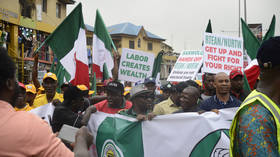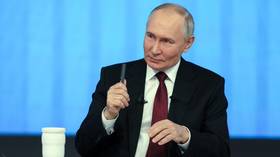Nigeria raises state salaries as workers threaten indefinite strike

Nigerian President Bola Tinubu announced an increase in the wages of lower-paid government employees on Sunday, in an attempt to resolve a dispute between labor unions that were planning a nationwide strike this week.
The president said in a speech marking the 63rd anniversary of Nigeria’s independence that the “average low-grade” worker would receive an extra 25,000 naira ($32) per month for the next six months.
The temporary measure comes after talks with “labor, business, and other stakeholders,” Tinubu said, adding that it aims to “enhance the federal minimum wage without causing undue inflation.”
The increase, which is expected to take effect this month, raises the minimum wage to 55,000 naira ($71).
Last week, the National Labour Congress (NLC) and Trade Union Congress (TUC) in Abuja called for an indefinite strike to begin on October 3 in protest at the government's “unwillingness” to address the rising cost of living.
Living and transport costs in Nigeria have risen since Tinubu, who took office on May 29, ended a fuel subsidy as part of reforms aimed at cutting the budget deficit. The devaluation of the local currency – the naira – has increased the cost of goods.
Talks with labor unions have stalled, prompting strikes, as workers accuse Tinubu of economic mismanagement.
Joe Ajaero, president of Nigeria’s labor association, said last month that the situation had become so dire that many workers were unable to pay for their transport to work.
In his speech on Sunday, Tinubu urged Nigerians to support his government during the economic crisis.
“I wish today’s difficulties did not exist. But we must endure if we are to reach the good side of our future,” he said, reiterating his pledge to strengthen the economy and cut transportation costs.
The president also announced the deployment of “cheaper, safer compressed natural gas (CNG) buses across the nation,” claiming they will run at a “fraction of current fuel prices, positively affecting transport fares.”
The government is also promising cash payments to 15 million “vulnerable households” from October to December of this year.
Meanwhile, Nigeria's Ministry of Information said in a separate statement on Sunday that government officials had met with the leaders of the main labor unions and agreed that “the issues in dispute can only be resolved when workers are at work, not when they are on strike.”
The NLC and TUC will “consider the offers by the Federal Government with a view to suspending the planned strike to allow for further consultations,” according to the ministry.













